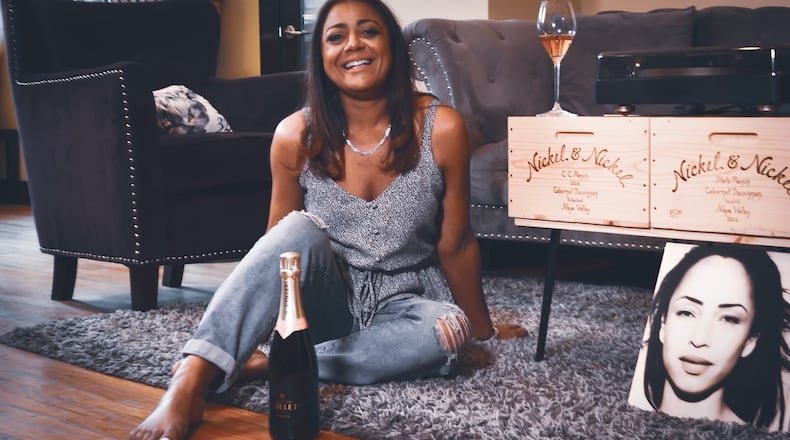Janeen Jason, wine buyer at VinoTeca wine shop, is the one who introduced me to Old Westminster, a small Maryland winery that makes canned piquette. Jason dubbed it the wine of the summer, noting its lighter body, effervescence and lower alcohol content. “It’s like watermelon kombucha,” she said.
As a certified sommelier, Jason can steer seasoned drinkers and new wine lovers alike in following their palate — that is, if a customer looks to her for advice and she has access to those wines.
After more than a decade working in restaurants, studying for wine certification, and now as buyer for the store, Jason has the education and training, and she knows exactly what goes onto VinoTeca’s shelves. “When people come in, I want to be the resource they need,” she said.
Yet, too often, customers question her knowledge and choose to wait for the store’s sommelier. “Oh, you are a sommelier?” is a typical response to her reply.
Credit: handout
Credit: handout
Working in a predominantly white and male industry has left Black women in the wine world constantly having to prove themselves. Yet, they also are working determinedly to amplify their numbers in the industry, aiming for power, access to resources and recognition.
“You can’t be what you can’t see,” Tahiirah Habibi said. Habibi created Hue Society, a group that advocates for and amplifies Black wine culture. “We get to develop leaders, wine from (our) standpoint, pairings we can relate to, words we use,” she said.
Words are important. Phrases such as “a seat at the table” are used to promote inclusion, but the phrase itself is debasing and privileged, Habibi said, because it comes from a space of implied power. “People use buzzwords, instead of thinking through them,” she said. “Inclusion is such a privileged concept. Who are you to include me?”
Like Habibi, 3 Parks Wine Shop owner Sarah Pierre is passionate about creating a community where Black wine professionals feel comfortable. “Don’t be afraid to walk into any room and ask questions,” Pierre said. “Any insecurities — shed all that.”
“It’s a white man’s business, and I came in fast and in full force,” Pierre said, adding that she took certification tests not for her, but to authenticate herself to peers. “It was my stamp of being official.”
It’s different being a business owner, she said, but still a problem. To this day, delivery drivers hand invoices to her white employees.
Credit: handout
Credit: handout
Pierre recounted the many times she was the only Black person in a room of wine professionals, not just the only Black woman.
Jason agreed. “You feel like the shortest and tallest person in the room. You stand out, for sure,” she said.
Steffini Bethea, owner of the Purple Corkscrew wine shop, noticed at trade shows that she wasn’t offered certain pours of wines. She would seek out a white sales representative to escort her to tables, in order to be offered tastings. “I had to get a white person to justify my existence of simply being there,” she said.
She also has had customers ask, “Do you only sell Black wine here?” before coming into the shop.
There is an implicit bias in simply being a Black woman who drinks wine. “We have a lot of pride,” Habibi said. “If we see ourselves somewhere, we want to join in. Wine isn’t marketed to us, unless it’s moscato, and we get stigmatized for it.” Entry-level drinkers usually start with sweeter wine, and people automatically assume that Black drinkers know nothing about wine, these women said.
“We don’t have many places to expand our palates,” Bethea said. “We are educated and well-traveled, but we don’t necessarily experiment, because the wine world is not welcoming to us.”
Credit: handout
Credit: handout
“I didn’t grow up with wine, and nobody I knew was into it,” Habibi said. She got into wine during college, attending receptions and realizing she was respected more when she could pronounce the names of grape varietals.
The solution is promoting exposure, education and access, she said. Roots Fund, a nonprofit cofounded by Habibi, works in tandem with Hue Society, providing resources and financial support. “It helps develop people to do what they want to do within the wine space,” she said.
It helped Jason with her expensive certification process. “Lack of representation often comes down to it simply being an expensive thing,” Jason said.
“We just need the opportunity,” Bethea added. “Oftentimes, that is the problem.”
“That’s what we’re doing,” Pierre said. “Now, we know the positions are there, and there are amazing careers to be had in the industry. We’ve done the legwork that we never should have had to do. We’ve opened the doors.”
Read more stories like this by liking Atlanta Restaurant Scene on Facebook, following @ATLDiningNews on Twitter and @ajcdining on Instagram.
3 Parks Wine Shop. 451 Bill Kennedy Way SE, Atlanta. 678-349-7070, 3parkswine.com.
Purple Corkscrew. 32 N. Avondale Road, Avondale Estates. 678-515-8232, purplecorkscrew.com.
VinoTeca. 299 N. Highland Ave. NE, Atlanta. 470-377-5100, shopvinoteca.com.
About the Author
Keep Reading
The Latest
Featured



